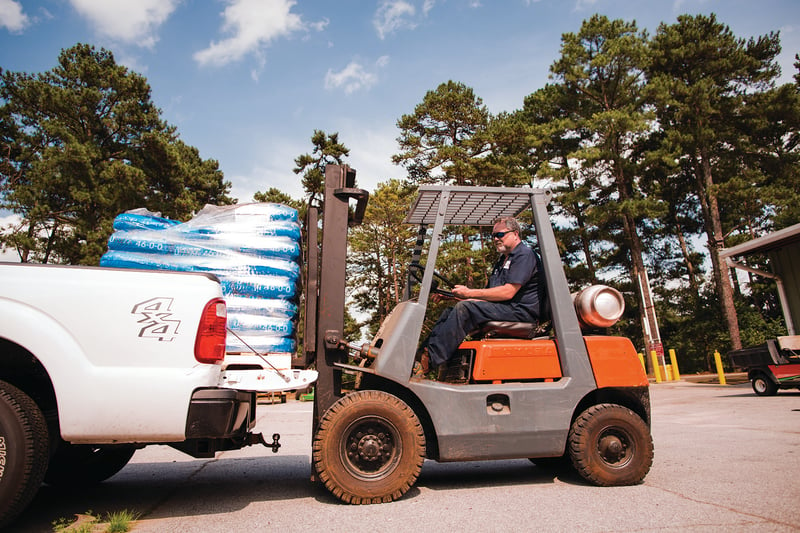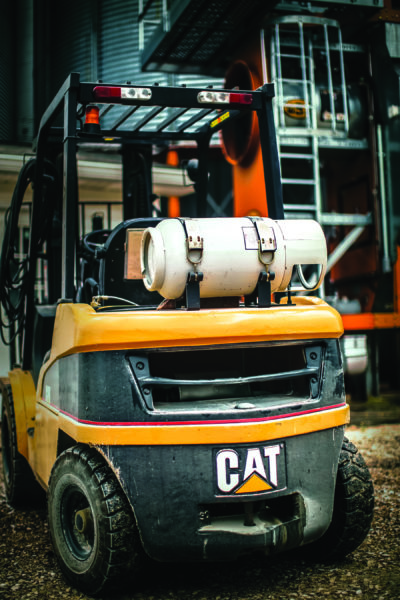
Do these five things every day to keep Forklift Operators safe
Don’t let safety take a back seat to productivity
When it comes to selecting a fuel for a forklift fleet, facilities managers and operators continue to choose propane to give their operation a lift.
In fact, 90 percent of Class 4 and 5 operators are using forklifts powered by propane, according to data from the Propane Education & Research Council. And they’re choosing propane over diesel or electric for a variety of reasons. Material handling, distribution, and logistics professionals appreciate propane for its versatility to work indoors and outside, low-emissions performance, and cost savings. Plus, unlike their electric counterparts, propane forklifts don’t lose power throughout the workday because a quick cylinder swap gets them back into business quickly.
Because of their many benefits, propane forklifts are trusted to keep business on schedule and work around the clock. Forklifts are often the backbone to any productive facility, but in order to keep material moving and operators safe, proper safety measures must be maintained at all times.
Safety is paramount in the material handling industry, and because heavy equipment is a common sight, it’s important for operators and other facility employees not to get complacent.

For facilities already operating propane forklifts, or looking to operate propane forklifts in the future, here are five important safety reminders:
- Inspect propane cylinders prior to operation. Check cylinders for rusting, dents, gouges, and leaks. Cylinders that show signs of wear or leaks shouldn’t be used and may need to be replaced, even if within the cylinder’s requalification date. A facility’s propane supplier will inspect cylinders each time they’re exchanged, too, removing any damaged cylinders from service.
- Store propane cylinders in a secure rack or cage. Propane forklift cylinders can be stored horizontally with the pressure relief valves in the uppermost position, and operators should use proper lifting techniques when removing them from storage and placing onto the machine. The facility’s propane supplier can help determine the best location for the cylinder storage rack or cage, which is generally located away from exits, stairways, entryways, and high-traffic areas.
- When not in use, close the service valves on cylinders. By doing so, operators help prevent unintended fuel loss, and potential injury around internal combustion engines.
- Ensure the pressure relief valve on the propane cylinder is secure and points away from locating pin. Check that the pressure relief valve fitting is roughly 180 degrees from the forklift’s locating pin.
- Establish a relationship with the local propane supplier. A facility’s propane supplier should be their go-to resource for all things safety. Suppliers can help inspect cylinders; make sure the entire team understands how to safely install propane cylinders onto their forklifts; and some propane suppliers offer additional safety training opportunities for forklift customers.
In addition to these propane-specific safety procedures, there are several other tips managers and operators should be aware of, too. For example, operators should complete routine checks of their equipment; wear appropriate personal protective equipment as provided by employer; buckle up while operating equipment; and keep loads within a forklift’s weight capacity. It’s also important that crews operate at a safe speed, use their horn when vision is obstructed, and use caution on grades and ramps. When finished operating, employees should set parking brake, lower forks, and set controls to neutral.
Another way to ensure safe operation and prevent workplace accidents is to establish regular safety briefings at the start of each shift. These meetings don’t have to be long, but briefly reviewing safety information can help crews keep safety top of mind as they start their workday.
More and more warehouses across the U.S. are finding propane forklifts to be the perfect fit for their operation and budget. Managers and operators trust this innovating technology to keep them more productive, reduce emissions, and enhance workplace safety. As propane-powered forklifts continue to be called upon in a variety of material handling operations, it’s important for operators to review and understand these forklift safety tips. By following forklift safety procedures behind the wheel, operators can protect themselves and coworkers. Not to mention, safe operation goes hand-in-hand with greater productivity.
To find out more about the benefits of propane-powered forklifts, visit Propane.com/Forklifts or for more safety information, visit Propane.com/SafetyFirst.
About the Author:
Jeremy Wishart is director of off-road business development for the Propane Education & Research Council. He can be reached at jeremy.wishart@propane.com.









